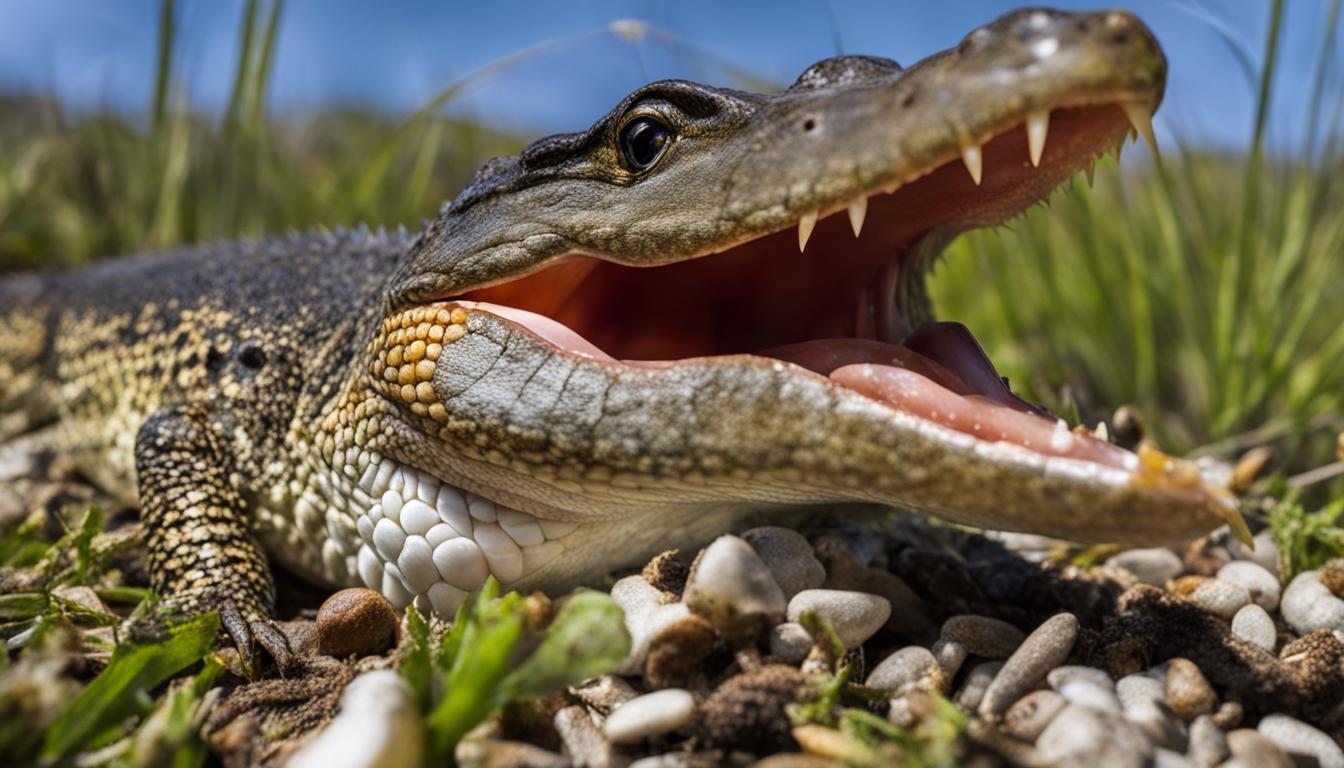Alligator lizards, fascinating carnivorous reptiles, have a diverse and non-selective diet. They will eat anything they can catch and swallow, making them opportunistic feeders. Their diet primarily consists of insects and their larvae, such as ground beetles, grasshoppers, crickets, and ichneumon wasps. Additionally, they consume a variety of arthropods like spiders, centipedes, scorpions, and sow bugs. Alligator lizards have been known to eat pulmonata snails, frog tadpoles, and even other lizards, particularly Western Skinks. Some reports suggest that they may even indulge in bird eggs, although this is still a topic of debate among researchers. They are not averse to consuming non-moving food like spider egg contents, dead lizards, baby mice, and various insects. Cannibalism is also observed among alligator lizards, with adults preying on the young and males and females consuming each other.
Key Takeaways:
- Alligator lizards have a non-selective diet, consuming a wide range of prey.
- They feed on insects, arthropods, snails, frog tadpoles, and even other lizards.
- Cannibalism among alligator lizards is not uncommon.
- They are opportunistic feeders and consume non-moving food as well.
- Reports of alligator lizards eating bird eggs are still a topic of debate.
Feeding Behaviors of Alligator Lizards
Alligator lizards display fascinating feeding habits that contribute to their successful predation. While their feeding behavior is often triggered by the movement of their prey, they can also consume non-moving food items like spider egg contents, dead lizards, baby mice, and insects. When approaching potential food, alligator lizards engage in meticulous visual inspection, moving their heads up and down, side to side, or in small circles to assess the size and distance of their edible targets. Moreover, if possible, they utilize their tongues to further inspect potential food items.
When an alligator lizard is ready to strike, it showcases its distinctive predatory behavior. It arches its back upward, straightens its front limbs, bends its head and neck downwards, and vigorously attacks with a swift downward stroke. This precise and efficient motion allows the alligator lizard to capture and consume its prey effectively.

- Ground beetles
- Grasshoppers
- Crickets
In wooded areas:
- Spiders
- Centipedes
- Scorpions
- Sow bugs
- Snails
Other possible food choices:
- Small mammals
- Birds
- Other lizard species (especially Western Skinks)
- Frog tadpoles (when available)
These diet variations highlight the adaptability of alligator lizards to different habitats, allowing them to exploit a range of food sources for their survival.
Feeding Habits of Alligator Lizards in Captivity
When it comes to feeding alligator lizards in captivity, mimicking their natural diet is crucial for their health and well-being. Alligator lizards are carnivorous reptiles, and their diet mainly consists of insects and other invertebrates. By providing a diverse range of food options, we can ensure they receive the proper nutrition they need. Here are some key considerations for feeding alligator lizards in captivity:
- Staple Food Sources: For the foundation of their diet, insects like crickets, mealworms, and roaches serve as excellent staple food sources. These insects are readily available and provide essential nutrients for the alligator lizards.
- Variety is Key: In addition to the staple insects, alligator lizards benefit from occasional offerings of other invertebrates such as earthworms and slugs. This variety helps ensure they receive a well-rounded diet.
- Supplementation: Alligator lizards in captivity may require additional supplementation to meet their nutritional needs. Calcium and vitamin D3 supplements can promote bone health and overall well-being. Consultation with reptile experts or veterinarians is essential to determine the appropriate supplementation regimen.
Alligator lizards have specific feeding habits that should be taken into account. They are active predators that require live prey to stimulate their hunting instincts. Care should be taken to provide appropriately sized prey items to prevent choking or digestive issues.
“Replicating the alligator lizard’s natural feeding habits and providing a balanced diet is crucial to maintaining their health and ensuring they thrive in captivity.”
By closely monitoring their diet and making necessary adjustments, we can ensure the feeding habits of alligator lizards are met in captivity, promoting their overall health and allowing them to thrive.
| Food Sources | Description |
|---|---|
| Insects (crickets, mealworms, roaches) | Staple food sources providing essential nutrients. |
| Invertebrates (earthworms, slugs) | Occasional offerings to provide dietary variety. |
| Supplements (calcium, vitamin D3) | Additional supplementation for optimal health. |
Conclusion
Alligator lizards have a diverse diet that plays a vital role in their nutrition and overall well-being. As carnivorous reptiles, they feed on a wide variety of prey, including insects, arthropods, snails, frog tadpoles, and even other lizards. Their feeding behaviors involve visually inspecting potential food and striking with a swift downward stroke to capture their prey.
The diet of alligator lizards can vary depending on their habitat. Different locations offer a range of prey items, allowing these reptiles to adapt and thrive. From insects in open habitats to a more diverse selection of spiders, centipedes, and scorpions in wooded areas, alligator lizards demonstrate their ability to explore and consume various food sources.
When keeping alligator lizards in captivity, it is essential to replicate their natural diet as closely as possible. Providing a balanced and varied diet that mimics their food choices is crucial for their nutritional health. Insects like crickets, mealworms, and roaches can serve as staple food sources, while other invertebrates like earthworms and slugs can be offered occasionally. Consulting with reptile experts or veterinarians can ensure the optimal feeding regimen, including necessary supplements like calcium and vitamin D3.
By understanding the dietary needs and feeding habits of alligator lizards, we can ensure their well-being and provide them with the necessary nutrition they require to thrive in both their natural habitats and captivity.
FAQ
What do alligator lizards eat?
Alligator lizards are carnivorous reptiles that have a non-selective diet. They eat a wide variety of prey, including insects, arthropods, snails, frog tadpoles, and even other lizards. They are opportunistic feeders and will consume anything they can catch and swallow.
What are the feeding behaviors of alligator lizards?
When approaching potential food, alligator lizards visually inspect edible objects, moving their heads up and down, side to side, or in small circles to judge the size and distance. They also inspect potential food items with their tongues. When ready to strike, they arch their backs upward, straighten their front limbs, bend their heads and necks downwards, and attack with a swift downward stroke.
How does the diet of alligator lizards vary in different habitats?
Alligator lizards’ diet can vary depending on their habitat. In open habitats like grasslands and chaparral, they primarily feed on insects and their larvae. In wooded areas, their diet includes spiders, centipedes, scorpions, sow bugs, and snails. They may also consume small mammals and birds. Alligator lizards are known to eat other lizard species, especially Western Skinks, and they may also consume frog tadpoles when available.
How should I feed alligator lizards in captivity?
When feeding alligator lizards in captivity, it is important to replicate their natural diet as closely as possible. Insects like crickets, mealworms, and roaches can serve as staple food sources. It is also beneficial to offer other invertebrates like earthworms and slugs. Providing a varied diet ensures proper nutrition. Consult with reptile experts or veterinarians to determine the optimal feeding regimen and any necessary supplementation.
What should I know about alligator lizard nutrition?
Alligator lizards have a diverse diet that provides them with necessary nutrition. They consume a variety of prey items, including insects, arthropods, snails, and even other lizards. In captivity, it is important to provide a balanced diet that mimics their natural food choices to ensure proper nutrition and the overall health of alligator lizards.


